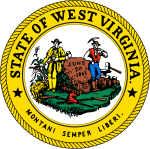
The 1958 United States Senate elections were elections for the United States Senate which occurred in the middle of President Dwight D. Eisenhower's second term. Thirty-two seats of Class 1 were contested in regular elections, the new state of Alaska held its first Senate elections for its Class 2 and 3 seats, and two special elections were held to fill vacancies.
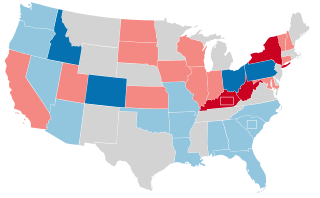
The 1956 United States Senate elections were elections for the United States Senate that coincided with the re-election of President Dwight D. Eisenhower. The 32 seats of Class 3 were contested in regular elections, and three special elections were held to fill vacancies. Although Democrats gained two seats in regular elections, the Republicans gained two seats in special elections, leaving the party balance of the chamber unchanged.
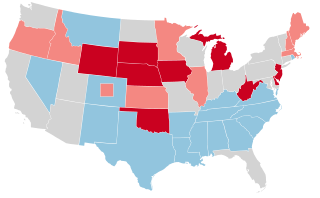
The 1942 United States Senate elections were held November 3, 1942, midway through Franklin D. Roosevelt's third term as president. The 32 seats of Class 2 were contested in regular elections, and two special elections were held to fill vacancies.
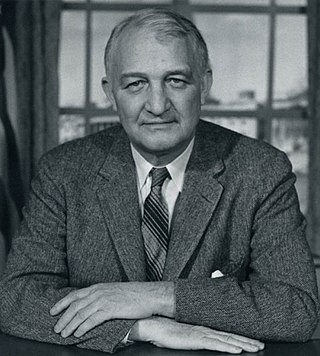
William Chapman Revercomb was an American politician and lawyer. A Republican, he served two separate terms in the United States Senate representing the state of West Virginia.
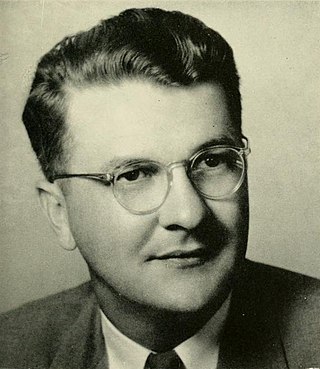
William Casey Marland, a Democrat, was the 24th Governor of West Virginia from 1953 to 1957. He is best known for his early attempts to tax companies that depleted the state's natural resources, especially coal, as well as overseeing implementation of school desegregation during the Civil Rights Movement when other Southern governors opposed it. Near the end of his life, he re-entered the public stage when a reporter found him driving a cab in Chicago. He responded to the negative publicity by making a public statement to the media about his recovery from alcoholism and indicated that his new, relatively humble job helped in that recovery.
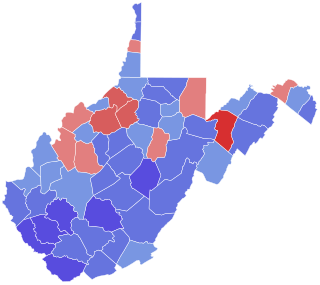
The 1966 United States Senate election in West Virginia was held on November 8, 1966. Incumbent Democratic U.S. Senator Jennings Randolph won re-election to a third term and a second full term.
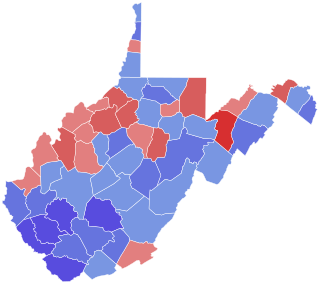
The 1954 United States Senate election in West Virginia took place on November 2, 1954. Incumbent Democratic Senator Matthew M. Neely was re-elected to a fifth term in office.
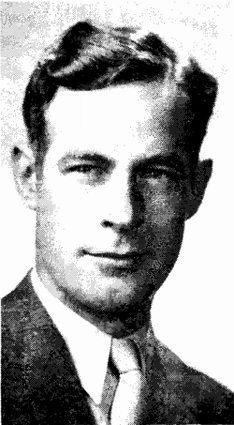
John Rinehart Blue was an American military officer, educator, businessperson, and politician in the U.S. state of West Virginia. Blue was a Democratic member of the West Virginia House of Delegates representing Hampshire County, from 1953 until 1959.

The 2014 United States Senate election in West Virginia was held on November 4, 2014, to elect a member of the United States Senate to represent the State of West Virginia, concurrently with other elections to the United States Senate in other states and elections to the United States House of Representatives and various state and local elections. This election was the fifth consecutive even-number year in which a senate election was held in West Virginia after elections in 2006, 2008, 2010, and 2012.
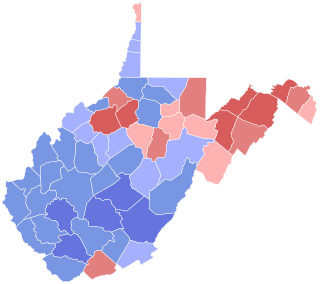
The 2016 West Virginia gubernatorial election took place on November 8, 2016, to elect the governor of West Virginia, concurrently with the 2016 U.S. presidential election, as well as elections to the United States Senate in other states and elections to the United States House of Representatives and various state and local elections. The primaries were held on May 10.
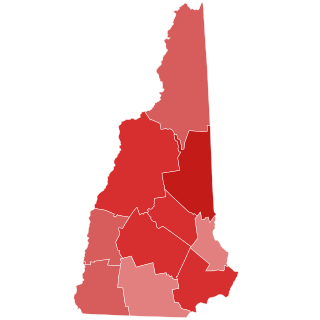
The 1956 United States Senate election in New Hampshire took place on November 6, 1956. Incumbent Republican Senator Norris Cotton won re-election to a full term, having first been elected in a 1954 special election.

The 2018 United States Senate election in West Virginia took place on November 6, 2018, to elect a member of the United States Senate to represent the State of West Virginia, concurrently with other elections to the United States Senate, elections to the United States House of Representatives, and various state and local elections. This was one of ten Democratic-held Senate seats up for election in a state won by Donald Trump in the 2016 presidential election.

The 2018 United States House of Representatives elections in West Virginia were held on November 6, 2018, to elect the three U.S. representatives from the West Virginia, one from each of the state's three congressional districts. The filing deadline was January 27, 2018. The primary elections were held on May 8, 2018. The elections coincided with the other elections to the House of Representatives, elections to the United States Senate and various state and local elections.
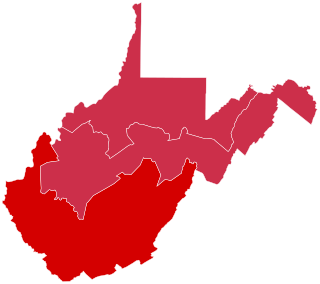
The 2020 United States House of Representatives elections in West Virginia were held on November 3, 2020, to elect the three U.S. representatives from the state of West Virginia, one from each of the state's three congressional districts. The elections coincided with the 2020 U.S. presidential election, as well as other elections to the House of Representatives, elections to the United States Senate and various state and local elections.

The 1958 United States Senate election in West Virginia was held on November 4, 1958.

The 2024 United States Senate election in West Virginia will be held on November 5, 2024, to elect a member of the United States Senate to represent the State of West Virginia. Democratic Wheeling mayor Glenn Elliott and Republican governor Jim Justice are seeking their first term in office. The winner will succeed independent incumbent Joe Manchin, who is not seeking a third full term. Machin was elected in the 2010 special election to fill the Senate seat vacated by incumbent Democrat Robert Byrd, who died in office on June 28, 2010, and was elected to a full term in 2012 and 2018.

Armistead Abraham "Cousin Abe" Lilly was an American lawyer, politician, and businessperson in the U.S. state of West Virginia. A Republican, Lilly served as the 16th Attorney General of West Virginia from March 4, 1913, until March 3, 1917.

Leon Parker Miller was an American lawyer, politician, and judge, in the U.S. state of West Virginia. Miller served as U.S. Attorney for the District of the Virgin Islands from 1954 to 1962. He was appointed the first African-American judge in West Virginia in April 1968, and became the state's first elected African-American judge in November 1968.

The 2024 United States House of Representatives elections in West Virginia will be held on November 5, 2024, to elect the two U.S. representatives from the State of West Virginia, one from each of the state's two congressional districts. The elections will coincide with the 2024 U.S. presidential election, as well as other elections to the House of Representatives, elections to the United States Senate, and various state and local elections. The primary elections are scheduled for May 14, 2024.

